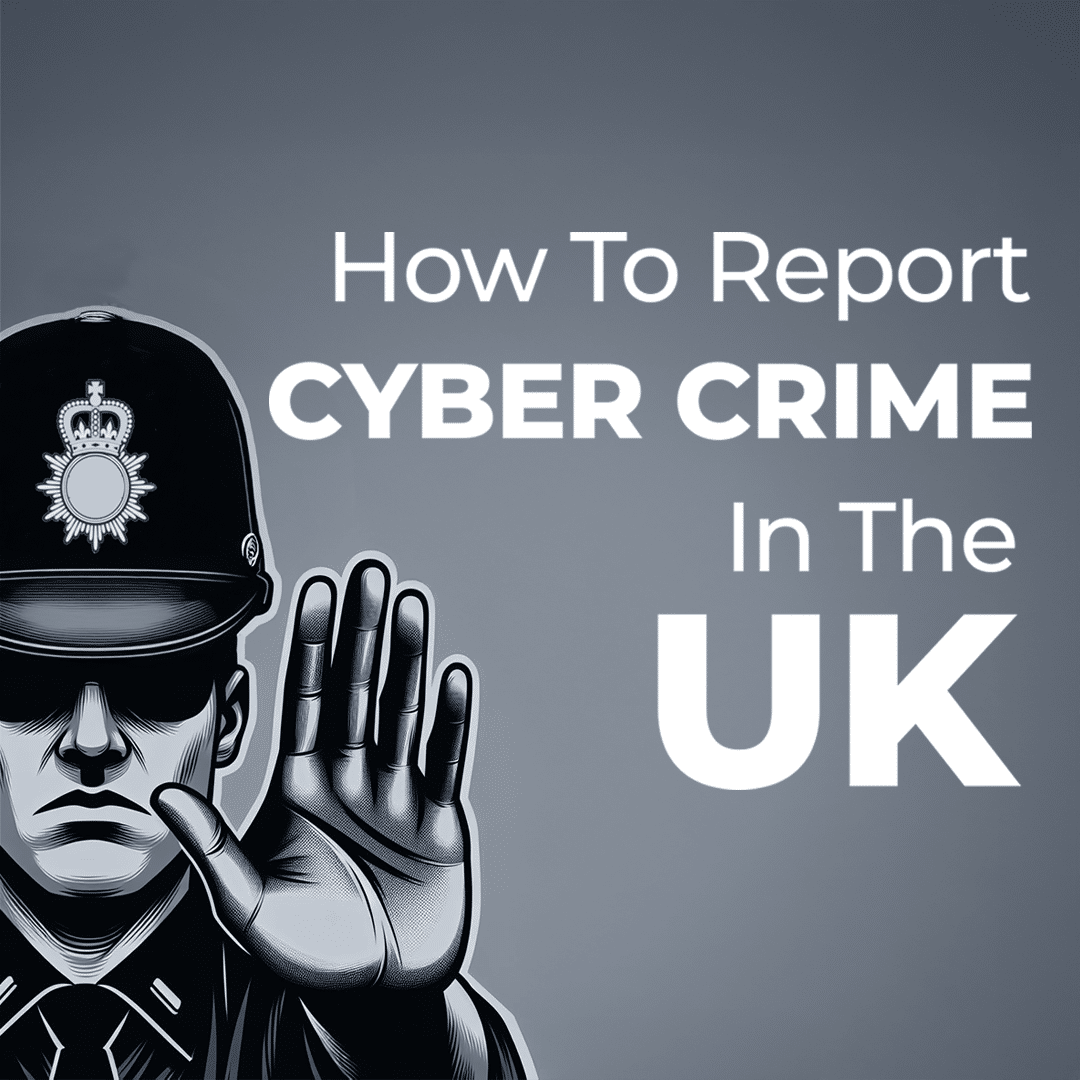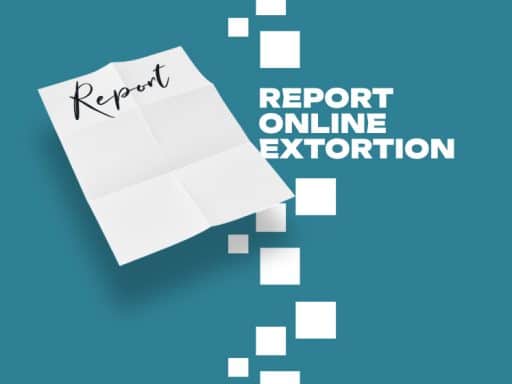Cyber crime continues to be one of the greatest threats against the UK with over four-million cyber crime and fraud offences reported in 2024. The same report revealed that half of all crime in England and Wales were incidents of cyber crime and fraud(1).
The National Lead Force (NLF), which is part of the City of London Police, is the main agency investigating and fighting fraud and cyber crimes in the UK. However, they can only investigate the cyber crimes they are aware of and rely on the reporting of businesses and individuals to create a proper response. Learning how to report cyber crime in the UK is important for this reason and that’s what we’re about to break down.
Understanding Cyber Crime in the UK
The National Crime Agency views ransomware as the greatest cyber threat to the UK. Ransomware attacks can lead to financial losses, business closure, exposed customer data, extortion and can impact national security. Cyber crime on this level is typically performed by high-end cyber crime groups in other countries. The rest of the crimes are less sophisticated but still a huge threat to the UK population(2).
Common Types of Cybercrime
In the digital era, almost everyone is on the internet which means anyone can be a victim of a cyber crime. Cyber attacks are causing serious harm to businesses and individuals in the UK. However, many people are still unaware of the tactics and crimes used online by criminals. Here are the most common types of cyber crime in the UK to look out for.
- Phishing. Fake emails and messages from legitimate entities containing a malware-infested link or asking for personal details and security information.
- Identity fraud. A criminal uses someone’s stolen details to commit a crime online.
- Online blackmail. Using deceptive online tactics, criminals use the stolen information that they have to blackmail the victims into paying to keep it off the internet. In the case of sextortion, the information can be the victim’s explicit images or videos.
- Hacking. When a criminal accesses a device without authorization. Typically, over the internet and using malware.
- Romance fraud. Criminals fake an identity online to build a relationship with you online but their ultimate goal is to get money or personal information from you.
- Cyberbullying and harassment. A form of bullying, coercion, or unwanted contact through the internet.
- Ransomware attacks. Criminals hijack devices with malware, take control of the files, and hold them for ransom. Commonly used with phishing scams.
- Intellectual property theft. Any instance where a criminal uses copyright-protected material or registered trademarks without permission(3) is considered intellectual property theft.
The Impact of Cybercrime
In 2022, cyber crimes accounted for the annual loss of twenty-seven billion euros in the UK economy. Businesses made up a significant portion of those losses(4). However, cyber crime also can affect the emotional state and reputation of victims. British Airways, for example, had a data breach in 2018 where more than four-hundred thousand customers had their login credentials and payment card details exposed(5). This could make these customers easy targets for hackers and can cause immense distress for the victims.
Reporting Cybercrime: Resources for Adults
Even if it was only an attempt, you should always report cyber crimes in the UK to the government. Reporting helps the National Lead Force track crime patterns, support investigations, and documents the incident.
So, how do you report cyber crime in the UK? The country has a simple process. There are also other independent organisations that you can use to report a cyber crime in the UK if you need support.
Action Fraud
A reporting database launched in 2009, Action Fraud is the national reporting centre for fraud and cyber crime in the UK. The centre is open 24/7 and to anyone in England, Northern Ireland, or Wales. Action Fraud does not investigate cyber crimes. Instead, they will pass your case to the National Fraud Intelligence Bureau for them to assess and send to the relevant local police. You can report to Action Fraud with a call or their online reporting service(6). While Action Fraud focuses on providing a report service for the general public, the NCSC is the UK’s defence against high-end cyber attacks and national threats.
National Cyber Security Centre (NCSC)
The National Cyber Security Centre or NCSC is the UK government’s cyber security authority. They work to defend the government and critical sectors of the UK like military, finance, energy, banking and more.
The NCSC also provides an incident response plan to cyber attacks that minimizes damage, help with recovery, and prepares for future attacks(7). Similarly to the Action Fraud website, the NCSC has an online reporting tool. However, they primarily work with organisations that provide an essential service to the UK. There are three things you need to know in order to make a report to the NCSC.
- Enter your contact information.
- Contact information for the organisation in question.
- Any details about the start and affect of the cyber incident(8).
Local Police Forces
With the exclusion of Scotland, local police forces in the UK recommend reporting anonymous cyber crimes to Action Fraud. If you know the person responsible or it’s an emergency, the reporting protocol is more complicated. Luckily, there is an online questionnaire for local police forces that helps victims figure out where they should report a cyber crime in the UK.
On the other hand, Scotland has its own law enforcement system that doesn’t work with Action Fraud. Instead, you can contact your local police station directly to report a cyber crime or visit in-person(9).
Financial Ombudsman Service
Set up by Parliament in 2001, the Financial Ombudsman Service is an organisation that resolves complaints between financial businesses and customers. This service cannot help cyber crime victims with fraud or a scam but they can help resolve how your bank or payment service handled the situation(10).
If you believe your bank or payment service handled the situation unfairly, you can make a complaint to the Financial Ombudsman Service and they will perform an investigation. Here are the three steps to make a complaint.
- Complain to the financial business. Notify the financial business that you are unhappy.
- Get a final response letter. Receive a final response from the business about their decision.
- Make a complaint to the Financial Ombudsman Service. You have to make a complaint to the service within six months of the final response letter(11).
Reporting Cybercrime: Resources for Children
Unfortunately, children are a huge target of cyber crimes, especially for sextortion. Minors are an extremely vulnerable population that are also susceptible to deceptive tactics. Many organisations and not-for-profits were created to fight against this trend of minors being victims of cyber crimes. Here are a few of the most notable.

Internet Watch Foundation (IWF)
The Internet Watch Foundation or IWF is a not-for-profit organisation that been working to stop child sexual abuse materials (CSAM) from circulating online. There are multiple ways that the Internet Watch Foundation goes about removing CSAM from the internet. Using a hash-generating technology, the Internet Watch Foundation attaches a unique number or hash to certain CSAM found online and shares that hash with their partners. This prevents any CSAM content with the hash from being uploaded on other platforms.
The Internet Watch Foundation also works to remove any CSAM they come across either through their reporting system or online investigations. By tracing the servers that hosts CSAM, the Internet Watch Foundation can report the content to the local authorities in the area or issue a takedown notice(12). You can anonymously report any CSAM you find through their reporting system(13).
Childline
This not-for-profit organisation provides a confidential and 24/7 hotline for minors about any issue that they are going through. The counsellors are trained in a variety of topics when it comes to helping young people, including cyberbullying and sextortion. You can contact Childline by phone, email, or an online chat(13).
UK Safer Internet Centre
Established in 2011, the UK Safer Internet Centre is a partnership between Childnet, the IWF, and SWGfL to make the internet safer for minors. These three charities work together to provide educational resources about online safety, identify harmful material, and operate a online safety helpline for minors dealing with harmful content over the internet(14).
Digital Forensics Corp: Supporting UK Cybersecurity
If you are a victim of cyber crime in the UK, Digital Forensics Corp. can help protect your information. Our team is full of cyber security professionals that are well-versed in the tactics of online criminals and we utilize the latest technology to protect against cyber attacks. For businesses or organisations, we provide incident response plans to prepare for and recover from any cyber attacks that may target your systems.
How DFC Helps with Investigations
Whether it’s online blackmail or a data breach, cyber criminals use anonymity to protect themselves from being held accountable. We eliminate this by tracing the digital footprint of the attacker, revealing their location and identity. Our digital forensic experts can also help with data recovery and malware removal if your device has been compromised.
Steps After Reporting Cybercrime
Reporting a cyber crime in the UK is an important first step in an incident response plan for businesses and individuals. However, it can take time for law enforcement to respond and you need to act fast to protect your information from any further harm. Whether you are a victim to online blackmail or a phishing scam, these next steps will help you secure your accounts.
- Documenting Evidence. Do not delete any correspondence between you and the attacker. Instead, take screenshots and document anything related to the cyber crime. All evidence can help the authorities understand the situation and even locate the perpetrator.
- Do Not Comply with Demands. In cases of online blackmail and ransomware, cyber criminals will demand financial compensation to resolve the situation. This is, however, a deceptive practice. Paying the perpetrator will only encourage them to demand more money. For sextortion and other forms of online blackmail, use delay tactics to postpone the deadline while you seek out professional help.
- Changing Passwords and Security Settings. If your information was breached, you need to reinforce your security. Change your passwords and enable two-factor authentication when it’s available. Make sure your new password is strong and difficult for hackers to guess.
- Monitoring Accounts and Credit Reports. Finances are rarely recovered from a cyber crime and it should be the main concern in a cyber attack. Monitor your accounts and credit reports for any suspicious behavior so you can quickly prevent any further harm.
Potential Resolution and Outcomes
Dealing with cyber crime in the UK can lead to many potential outcomes. Some are better than others but being aware of these outcomes can make it easier to work toward a favorable one. Here are some of the potential resolutions from being a victim of a cyber crime in the UK.
Recovery of Losses and Data
It’s common for victims of cyber crime in the UK to experience financial losses from the attack. Unfortunately, it’s rare to be able to recover these finances. However, there are certain instances in which victims can recover their finances through insurance or legal action taken against the perpetrator. Work with a legal professional or financial consultant if you are interested in your recovery options.
When it comes to data recovery, there are many ways your data can be recovered after a ransomware attack. Working with professionals is more likely to provide the best results with data recovery and they can also remove any leftover malware from your devices. However, there is software you can install to help with data recovery and malware removal on your own.
Digital Forensics Corp: Your Partner in UK Cyber Defence
Cyber crime in the UK is pervasive issue that you need to be prepared for. Luckily, there are plenty of organisations out there that are working to spread awareness about online safety.
If you need digital experts to help with data recovery or assistance in protecting your digital reputation, Digital Forensics Corp. can provide you with both of those services and plenty more.
Sources:
- https://www.ons.gov.uk/releases/crimeinenglandandwalesyearendingmarch2024
- https://www.nationalcrimeagency.gov.uk/what-we-do/crime-threats/cyber-crime
- https://www.met.police.uk/advice/advice-and-information/fa/fraud/
- https://www.gov.uk/government/statistics/cyber-security-breaches-survey-2024/cyber-security-breaches-survey-2024#chapter-1-introduction
- https://www.bbc.com/news/technology-54568784
- https://www.actionfraud.police.uk/
- https://www.ncsc.gov.uk/
- https://report.ncsc.gov.uk/
- https://www.scotland.police.uk/advice-and-information/scams-and-frauds/cyber-related-financial-crime/
- https://www.financial-ombudsman.org.uk/who-we-are
- https://www.financial-ombudsman.org.uk/consumers/how-to-complain
- https://www.iwf.org.uk/about-us/how-we-assess-and-remove-content/
- https://www.iwf.org.uk/en/uk-report/
- https://saferinternet.org.uk/about
- https://www.cps.gov.uk/legal-guidance/cybercrime-prosecution-guidance
- https://southeastcyber.police.uk/protect/
- https://www.cybersmile.org/






